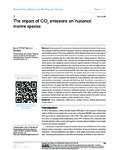The impact of CO2 emissions on 'nuisance' marine species
| dc.contributor.author | Hall-Spencer, Jason | |
| dc.contributor.author | Allen, R | |
| dc.date.accessioned | 2015-11-11T11:13:17Z | |
| dc.date.available | 2015-11-11T11:13:17Z | |
| dc.date.issued | 2015-11-05 | |
| dc.identifier.issn | 2230-2484 | |
| dc.identifier.issn | 2230-2484 | |
| dc.identifier.uri | http://hdl.handle.net/10026.1/3797 | |
| dc.description.abstract |
Anthropogenic CO2 emissions are being taken up from the atmosphere by the oceans, increasing the availability of dissolved inorganic carbon but reducing both the carbonate saturation and pH of seawater. This ocean acidification affects biological processes in a wide range of marine taxa. Here, we assess the likely responses of 'nuisance' species to ocean acidification, meaning those organisms that have undesirable effects from a human perspective. Based on a synthesis of evidence available to date, we predict increased growth and toxicity in harmful algal bloom species, and a significant increase in invasive algae in response to increased CO2 availability. Blooms of stinging jellyfish are also expected to increase since they are highly resilient to acidification. The effects of ocean acidification on invasive molluscs (eg, oyster drills), damaging echinoderms (eg, crown-of-thorns starfish), and a wide range of nuisance taxa will vary depending on species and location. In the USA, for example, the invasive crab Carcinus maenas is resilient to projected increases in CO2 and its impact on marine communities is expected to increase since it feeds on organisms that respond to ocean acidification with weaker defensive traits and lower recruitment. Conversely, the Red King Crab, Paralithodes camtschaticus, is adversely affected by acidification and so is expected to die back in the Barents Sea which it has invaded. Overall, we suspect that there will be an increase in nuisance species, as many have traits that are resilient to the combined warming and acidification caused by rising CO2 levels; region-specific assessments are needed to understand responses of nuisance species in local habitats. Finally, we highlight the need for targeted studies of the effects of global change on particularly harmful marine taxa such as the seaweed Caulerpa taxifolia, the starfish Asterias amurensis, several invasive ascidians, and the lionfish Pterois volitans. | |
| dc.format.extent | 33-46 | |
| dc.language | en | |
| dc.language.iso | en | |
| dc.publisher | Informa UK Limited | |
| dc.subject | 14 Life Below Water | |
| dc.title | The impact of CO2 emissions on 'nuisance' marine species | |
| dc.type | journal-article | |
| dc.type | Article | |
| plymouth.volume | 4 | |
| plymouth.publication-status | Published online | |
| plymouth.journal | Research and Reports in Biodiversity Studies | |
| dc.identifier.doi | 10.2147/RRBS.S70357 | |
| plymouth.organisational-group | /Plymouth | |
| plymouth.organisational-group | /Plymouth/Faculty of Science and Engineering | |
| plymouth.organisational-group | /Plymouth/Faculty of Science and Engineering/School of Biological and Marine Sciences | |
| plymouth.organisational-group | /Plymouth/PRIMaRE Publications | |
| plymouth.organisational-group | /Plymouth/REF 2021 Researchers by UoA | |
| plymouth.organisational-group | /Plymouth/REF 2021 Researchers by UoA/UoA07 Earth Systems and Environmental Sciences | |
| plymouth.organisational-group | /Plymouth/Research Groups | |
| plymouth.organisational-group | /Plymouth/Research Groups/Marine Institute | |
| plymouth.organisational-group | /Plymouth/Users by role | |
| plymouth.organisational-group | /Plymouth/Users by role/Academics | |
| dc.identifier.eissn | 2230-2484 | |
| dc.rights.embargoperiod | Not known | |
| rioxxterms.versionofrecord | 10.2147/RRBS.S70357 | |
| rioxxterms.licenseref.uri | http://www.rioxx.net/licenses/all-rights-reserved | |
| rioxxterms.type | Journal Article/Review |


